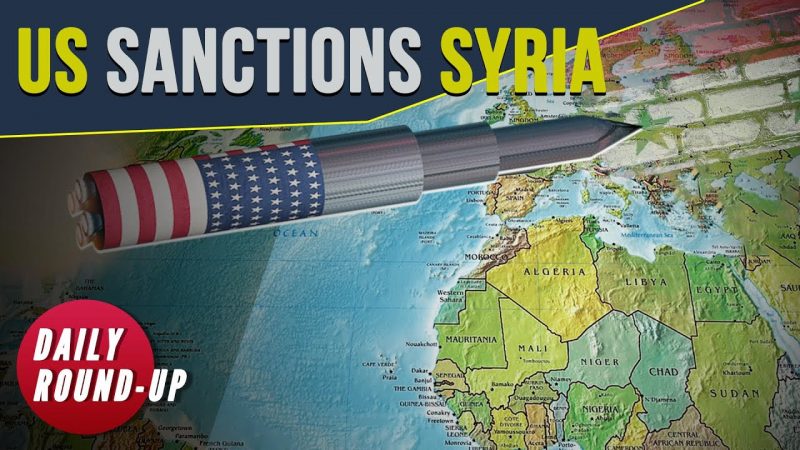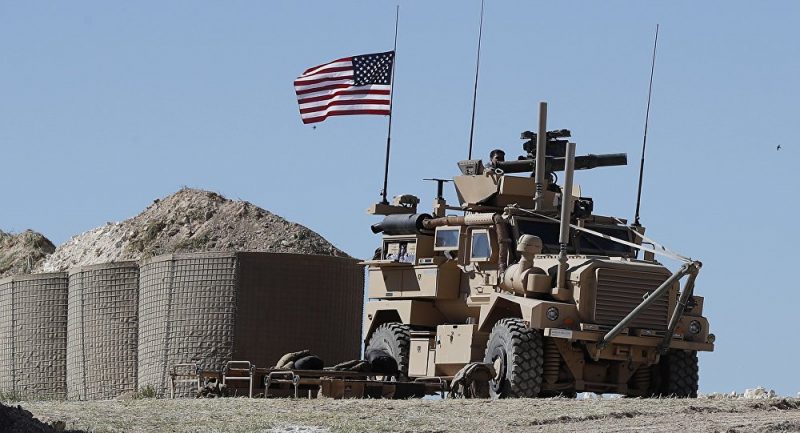
While the US military presence in northeastern Syria is purportedly aimed at preventing the re-emergence of ISIS, there is little denying that the US presence and the overall policy regime it is following in Syria is actively contributing to down grading the country’s military and political gains in the ten long years of a multi-front war.
On the one hand, direct US military presence in Syria is hindering the country’s unification under Damascus, and on the other hand, US occupation of Syrian oil reserves has deprived the war-torn country of a critical source of income that it could otherwise use to rebuild itself.
At the same time, US sanctions on Syria appear to be working as an economic pathogen that blocks the country’s access to sufficient financial resources.
The US Syria policy, centered on plundering, isolating and sanctioning Syria, is therefore a critical factor in US attempts to ravage the country, yet those have yet failed to bring a regime-change or change the country’s behavior, especially its pro-Iran and pro-Russia foreign policy orientation.
It is about time the new US administration realized the fatally flawed policy of the Trump administration and redefined its approach.
Therefore, while the US claims to be doing “humanitarian work” in Syria, its regime of sanctions is doing just the opposite.
A recent report of Carter Centre showed how “by restricting access to certain goods and services, financial channels, and operational partners, sanctions have altered and sometimes restricted the programs of humanitarian organizations.”
And, while the US does give licenses to allow humanitarian organizations to implement their programs, the report shows how a deliberately designed broad and complex licensing regime prevents these organizations from operating freely and easily in the conflict zone.

The report shows that “the intricacies of the licensing structures and the costly legal fees (that can go up to $170,000 USD) needed to navigate the framework often impede the smooth and rapid delivery of humanitarian aid, affecting INGO flexibility to respond to emergencies, particularly for INGOs with limited resources.”
The currently imposed US sanctions regime includes not only US government assistance and aid, but also have a “secondary tier” which applies, among many other cases, to non-US companies that support or engage in significant transactions with the Syrian government and designated Syrian companies and personnel, and non-US companies that support Syrian government oil and gas production.
As is evident, the sanctions regime is there to serve US interests. Whereas it prevents “non-US” companies from supporting Syrian oil and gas production, it does have enough flexibility to allow shadowy US companies, run by former US military men, to operate in northeastern Syria and plunder its oil.
Delta Crescent Energy [DCE], for instance, is a newly founded US company that waded into Syrian oil last year.
While any established oil enterprise would not risk investing in a high-risk zone as Syria, DCE’s founder, James Reece, a former US Delta Force personnel, appeared to be “wise” enough to put his money into Syrian oil and win a license to explore, refine and export oil from a corner of war-torn Syria controlled by a US-backed Kurdish-dominated militia.
US officials endorsed the project “because we support trying to get the economy of north-east Syria up and running,” said Joel Rayburn, US special envoy to Syria.
The US sanctions on Syrian oil are, therefore, deliberately designed to allow US companies to exploit and benefit from the Syrian oil. As the Carter Centre report shows, the US sanctions have otherwise badly impacted flow of oil from and into Syria.
It says, “US sanctions announced in November 2018 against a network of Russian and Iranian companies and ships transporting oil to Syria at least temporarily constricted Syria’s oil imports, which Syria now depends on for fuel since the civil war destroyed much of Syria’s domestic oil production. US sanctions, for example, appear to be making the Suez Canal operator wary of allowing Iranian oil tankers bound for Syria to transit the canal, and Saudi Arabia, which owns a pipeline allowing oil to bypass the canal, is not allowing Iranian oil to flow through the pipeline.”

However, while the policy the US has followed in last few years is centered on bringing the Syrian regime to its knees, it has obviously failed, making a change in policy necessary.
This abject failure has put the US in a position where it confronts a critical choice between the current approach, which has succeeded only in contributing to a politically and economically weak and unstable, or a reconceived diplomatic process that should aim to develop a detailed framework for engaging with the Syrian government.
Of course, the process of reconceiving Syria policy needs to start with a scrapping of all sanctions and a unification of Syria under Damascus.
This, however, will imply that the US, like many other countries, will ultimately have to abandon its maximalist demand to bring a regime change in Syria.
Therefore, the crucial question is: will the Joe Biden administration aim to review, like it has reviewed policies of the Trump administration in a dozen of other areas, its Syrian policy and lift its sanctions regime?
Antony Blinken, when he was Biden’s foreign policy advisor in May 2020, acknowledged in an interview that the US Syria policy was an abject failure. He said,
“the last administration has to acknowledge that we failed not for want of trying, but we failed. We failed to prevent a horrific loss of life. We failed to prevent massive displacement of people internally in Syria and, of course, externally as refugees.”
However, as typically American as he could be, his “new” policy differs from the Trump administration in as much as he sees merit in reengaging the diplomatic track for resolution.
This acknowledgment of failure comes against the backdrop of US’ endless wars in Afghanistan, Iraq and Syria and the need to withdraw from these conflict zones.
While it remains to be seen what the new administration will do with regards to Syria, it has already said that it is reviewing US withdrawal plans from Afghanistan.
Going by that, the most likely course of action in Syria the new administration will take may not involve an immediate withdrawal, although it may involve an easing of sanctions and some diplomatic engagement.
This will flow from the realization that the US lost its leverage in Syria a long time and that Syrian peace can no longer be a made-in-America thing.
***
Salman Rafi Sheikh, research-analyst of International Relations and Pakistan’s foreign and domestic affairs, exclusively for the online magazine “New Eastern Outlook”.
Republished by The 21st Century
The views expressed in this article are solely those of the author and do not necessarily reflect the opinions of 21cir.
